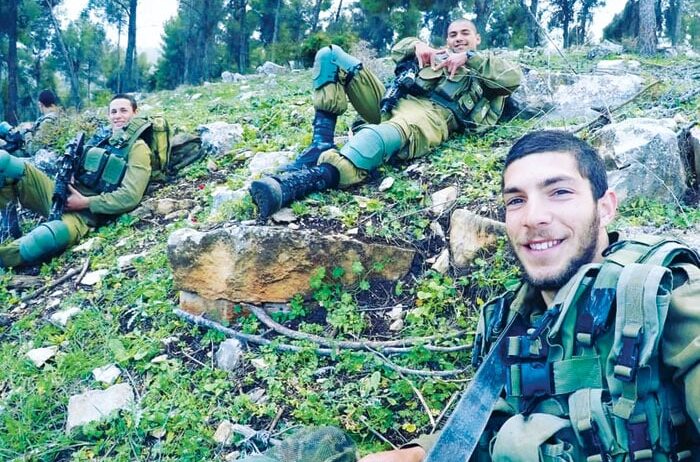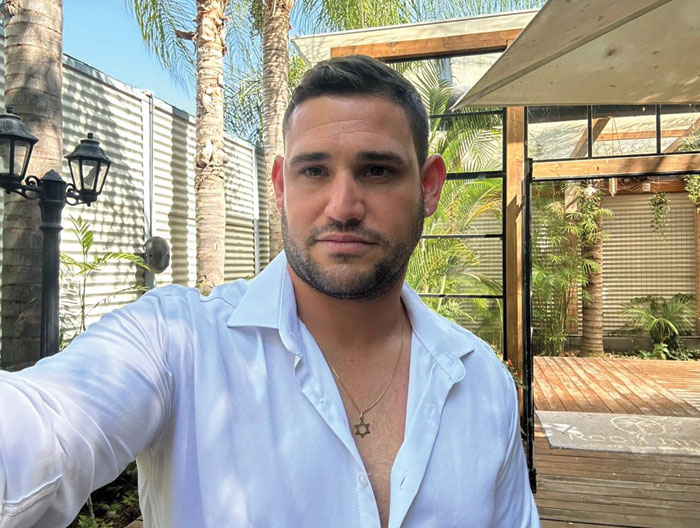 Gal Rosenberg (right)
Gal Rosenberg (right) In 2017, Gal Rosenberg, a combat soldier in the Israeli Defense Forces (IDF), was injured during a raid to capture two ISIS terrorists in Jenin, a Palestinian city in the West Bank.
“We were ambushed during the operation. There were moments when I thought I would never make it back home. It was very scary. I was thinking to myself, how on earth did I end up here?“ – Gal Rosenberg
Talking about that harrowing experience, he said, “We were ambushed during the operation. There were moments when I thought I would never make it back home. It was very scary. I was thinking to myself, how on earth did I end up here? I was only 21 years old, practically a child.”
In a recent phone interview with the Jewish Journal from his home in Israel, Rosenberg disclosed that despite suffering from severe post-traumatic stress disorder (PTSD) and four herniated discs in his lower back, he has no regrets about serving in the Golani Brigade, one of Israel’s elite combat units. “I would do it all over again today. It’s a mission. I served my country, and I did what I had to do.”
Rosenberg could have requested release from the army due to his injuries, but he chose to continue his service. “I felt a sense of duty to complete my service like everyone else,” he said. “At that time, I didn’t fully grasp the severity of my injury or my PTSD. Those realizations came later.”
Like many soldiers grappling with the invisible wounds of war, it took considerable time for Rosenberg to be officially recognized by the IDF as a wounded soldier. When injuries aren’t readily apparent and you appear outwardly healthy, convincing others of your struggles can be challenging. “It was a four-and-a-half-year process before I was acknowledged as a wounded soldier,” he said. “However, the recognition itself was challenging as well because there was no escape from it. This is who I am. It was a moment that shattered me.”
During his darkest moments, Rosenberg found comfort and solace in Belev Echad, which translates to “One Heart.” Belev Echad is a global movement dedicated to assisting wounded IDF soldiers in accessing the support they require. Rosenberg speaks fondly of Belev Echad, stating, “They became my home, my family. No one understands what I’m going through better than them. When you return home, it’s hard for people to comprehend your experiences. Only those who have been there can truly understand. Within the first 10 minutes of meeting them, we felt like we’d known each other our entire lives.”
Belev Echad was established in 2009 by Rabbi Uriel Vigler and his wife Shevy. It began as an annual tour of New York City for wounded IDF soldiers, serving as a gesture of solidarity and support.
The organization operates a center in Kiryat Ono, near Tel Aviv, where wounded soldiers can come together for meals, participate in MMA and Krav Maga classes, engage in dog training and embark on trips. Rosenberg, who is currently studying architecture at Bezalel Academy of Arts and Design in Jerusalem, recently relocated closer to the center to access its services more frequently. “This is my second home, and the people there are my second family,” he said. “They provide us with so much. Every week, I take surfing lessons with a group from Belev Echad, and it’s immensely beneficial.”
Each year, Belev Echad sends a group of recovering soldiers on a 10-day, five-star tour abroad, providing them with an unforgettable experience. On October 10th, they are set to bring eight wounded IDF soldiers to Los Angeles — four men and four women. Rosenberg, who will be joining the group, participated in a similar trip to New York a few years ago. “It was truly amazing,” he said. “We received an overwhelming amount of love and support, more than I had ever experienced in my life. I felt deeply appreciated. We traveled, met with members of the community, shared our stories and discussed how we were coping. Dealing with what we’ve been through is still incredibly challenging. I’m seeing a psychologist, and I also got a golden retriever to help me with my PTSD.”
Rosenberg has two younger brothers, one of whom has just completed his service in a combat unit, while the other is preparing to enlist soon. “I told him that he should join a combat unit like me because we need to protect our home. However, he is understandably apprehensive due to what happened to me, and I completely understand that. I was so traumatized by my experiences that, after leaving the IDF, I deleted all my service photos. I have just one left. I didn’t want to remember anything from that time. Until I started attending Belev Echad, it was incredibly difficult for me to discuss the army or have any connection to it. The organization gave me hope that I could recover and have a happy and healthy life.”

Matan Segelman, a 30-year-old participant in the upcoming trip to Los Angeles, also experienced PTSD during 2012’s Operation Pillar of Defense in the Gaza Strip. “My unit was severely understaffed,” he said, “and as a result, I had to shoulder the responsibilities of both a commander and the soldiers themselves, as many of them were cadets. I didn’t sleep for six consecutive days. When one of my superiors noticed that I wasn’t feeling well, he urged me to rest while he took charge of the soldiers. However, sleep eluded me. The following morning, when my commander inquired about my well-being, I assured him that all was fine. I didn’t want him to suspect that something was amiss, so I returned to the operation.”
However, nothing was fine with Segelman, and he began to exhibit unusual behavior. At that juncture, his commanders decided it was necessary to have him evaluated by a psychologist, who subsequently referred him to a psychiatrist. The diagnosis was manic depression, and which was treated with medication.
Segelman opened up about the enduring impact of his condition, saying, “It still affects me. I’ve grappled with depression, experienced manic episodes, and found myself perilously close to contemplating suicide. There are moments when you lose touch with reality, feeling invincible and on top of the world, followed by times of profound despair.”
Following his discharge from the army in 2014, Segelman’s battle with depression deepened. He said, “I had to fight to be recognized by the defense office as a wounded soldier suffering from PTSD. Sitting in front of a committee, trying to convey the extent of your suffering, and feeling like they don’t believe you can be a traumatic experience. During that time, I distanced myself from friends and family, and it was an extremely trying period.” With the support of a psychologist and a psychiatrist, Segelman eventually found joy in life again. He attributes a significant part of his recovery to Belev Echad. “They envelop you with love,” he said. “Everything we do there, from the trips to our weekly surfing sessions, nourishes our souls.”
Segelman fondly reminisced about his 2019 trip to New York, describing it as the most enriching experience. “That trip breathed life into our souls. Being among people who have shared similar experiences is profoundly comforting. The Jewish community we encountered was incredible, treating us like members of their own family. Feeling that love and appreciation for our service warmed our hearts. It truly was an extraordinary journey.”
The organization is seeking Jewish families to host these wounded warriors for dinners, breakfasts, or overnight stay. If you are interested in hosting, please reach out to Belev Echad at: (212) 831-2770.
To read more about the soldiers and the Tours of happiness, please visit: https://belevechad.nyc/programs/usa/us-tours-of-happiness/#page_section_4






















 More news and opinions than at a Shabbat dinner, right in your inbox.
More news and opinions than at a Shabbat dinner, right in your inbox.